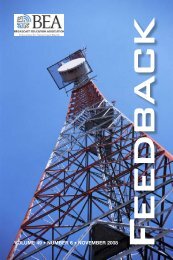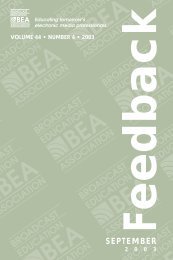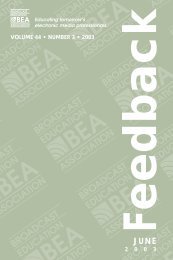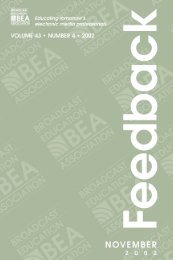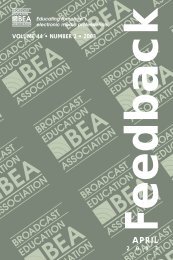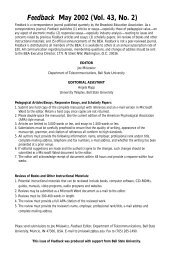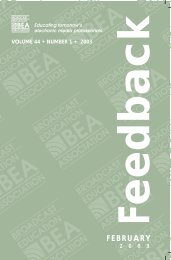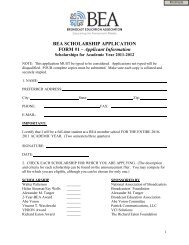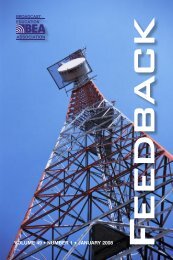[ ARTICLE ]Is Radio Education Deadin Today’s BroadcastCurriculum?A Pilot Study of Broadcast Educators andOklahoma Radio Professional’s Attitudes andPerceptions Of Radio Education in Today’sBroadcast CurriculumDr. David NelsonAssistant Professor ofMass CommunicationUniversity of CentralOklahomaDepartment of MassCommunicationMass CommunicationBuilding, Box 197100 North UniversityDriveEdmond, Oklahoma73034Email: Dnelson7@ucok.eduPhone: (405)974-2584Fax: (405) 974-3837The work was orallypresented for theCourses, Curriculaand AdministrationDivision PaperCompetitionat the BroadcastEducation AssociationConvention 2008AbstractSome believe the once symbiotic relationship between radioeducation and the radio profession is slowly deteriorating. Somehave suggested the relationship is being negatively affectedby broadcast education’s push to consolidate their broadcastprograms by shrinking and deleting radio courses for today’sconverged curriculums. As radio course work fades, many fearthe wrong message is being sent to the radio industry that theuniversity’s role as a feeder program is a thing of the past.PurposeThe purpose of this experimental pilot study is to understandwhat affect the perceived national trend may have on the perceptionsand attitudes of broadcast educators and the local radiobroadcast professionals regarding radio education in the state ofOklahoma. The pilot study will help generate some data to assistbroadcast educators in understanding what radio professionals’attitudes and perceptions are regarding radio education. Itwill also expose broadcast educators to the presumably negativeattitudes surrounding the new converging curricula. And, mostimportantly, it will add to the very limited literature regardingthe attitudes and perceptions broadcast faculty and radio professionalshave of radio education and its role in today’s broadcastprograms.The paper will begin by briefly examining the history of radioeducation, the changing landscape of today’s broadcast curriculum,the results of two sets of interviews examining the attitudesand perceptions of broadcast educators and radio broadcasters,and the results from the surveys administered to Oklahomabroadcast educators and radio professionals. The paper will end4<strong>Feedback</strong> January 2009 (Vol. 50, No. 1)
with a discussion section and the pilot study’s limitations and suggestions.A Brief History of Radio in Higher EducationColleges and universities have always played an important role in the developmentof radio broadcasting. Journalism education, a precursor of radio broadcast education,began in the U.S. in 1869 at Washington College (Sterling, 2004). Since then, broadcastingundergraduate education has grown into a viable and respectful discipline ofresearch and theory. For the last 100 years higher education has provided an abundanceof data for the broadcast industry in the areas of radio broadcast technology, managementand programming.Educational Radio: The 1920s and 1930sBy 1925, higher education institutions had 124 radio stations on the air (Rinks,2002). The majority were operated by college departments and schools to research newradio technologies, provide distance learning courses, and experiment with various theories(Thompsen, 2001). The data provided from the research became a valuable resourcefor commercial broadcasters that was often adopted if financially practical.Although, 13 percent of the radio stations in 1923 were owned by universities,second only to radio manufactures, the creation of the Federal Radio Commission(FRC) and many of its new governing policies had a huge impact on the numberof stations operated by educational institutions (Barnouw, 1966; Thompsen, 2001).Technological demands and changes in the structure of how licenses were granted allaffected the growth of educational broadcasting (Albarran & Pitts, 2001). By 1929college courses began slowly sprouting up on American college campuses with theUniversity of Southern California (USC) leading the way. USC created the first regularradio course in higher education with many more institutions soon to follow (Sterling,2004).By the early 1930s, a gradual thinning of stations owned by institutions in highereducation was inevitable. Caught by the crush of the great depression and the technologicaldemands by the FRC many stations went commercial and others ceased alltogether (Rinks, 2002). However, a 1933 survey indicated 16 universities and collegeshad added at least one radio course to their curriculum. From there, radio course developmentin higher education increased rapidly with 300 institutions boasting at least oneradio course and at least eight institutions providing a bachelors degree in radio broadcasting(Sterling, 2004).The Decline and Resurrection of Radio EducationThe 1940sThe 1940s was a changing period for radio education. Fewer universities had radiostations but more radio courses were present on U.S. campuses. With the popularity ofEdward Murrow’s WW II radio reports and the growth of media research a rebirth ofradio was taking place on college campuses. The academic community responded byestablishing more radio broadcasting courses in higher education curricula. By the endof the decade, 420 colleges and universities offered radio courses. Of those, 30 offeredbachelors, 15 masters, and three doctoral degrees (Sterling, 2004). With these curriculaBEA—Educating tomorrow’s electronic media professionals 5
- Page 1: VOLUME 50 • NUMBER 1 • JANUARY
- Page 6 and 7: changes, the mission and goals of m
- Page 8 and 9: Attitudes and Perceptions of Oklaho
- Page 10 and 11: Figure 4RELATIONSHIP STATUS BETWEEN
- Page 12 and 13: O’Donnel, L., Hausman, C, & Benoi
- Page 14 and 15: 2015 $29.9 $15.0 $44.92016 $28.4 $1
- Page 16 and 17: 2013 $23.5 $5.7 $29.22014 $21.3 $6.
- Page 18 and 19: New York Times and some others —
- Page 20 and 21: [ ARTICLE ]HD Radio in theIntermoun
- Page 22 and 23: digital radio receiver the followin
- Page 24 and 25: and outside the broadcast studio…
- Page 26 and 27: Barboutis, C. (1997). “Digital Au
- Page 28 and 29: the game. One can also find a numbe
- Page 30 and 31: Razor scooters (Khermouch, 2001). A
- Page 32 and 33: ing during the rest of the year. Fu
- Page 34 and 35: * Sprint made its two humorous Supe
- Page 36 and 37: ing another $150 worth of free cove
- Page 38 and 39: efore the game to highlights of the
- Page 40 and 41: Caywood, C. L., Schultz, D. E., & W
- Page 42 and 43: Retrieved September 20, 2008 from:
- Page 44 and 45: [ ARTICLE ]HEADS UP: What DeansExpe
- Page 46 and 47: ment to your teaching or research.
- Page 48 and 49: Dr. Robert L. Snyder died early in
- Page 50 and 51: Accrediting Council forEducation in
- Page 52 and 53: Faculty and Student NewsCompetition
- Page 54 and 55:
[ DIRECTORY ][ Staff, Executive Com
- Page 56 and 57:
Alaska Broadcasters AssociationAriz
- Page 58 and 59:
Indiana UniversityInternational Col
- Page 60:
2008-09 BEA OFFICERSPresidentMark T



